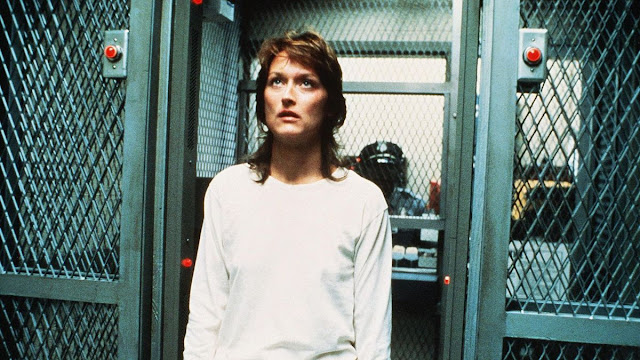Silkwood
What separates 1983's SILKWOOD from any number of its era's television Movies of the Week, often likewise based on actual events? Certainly a cast fronted by Meryl Streep, Cher, and Kurt Russell. Also a director named Mike Nichols, known for great films like THE GRADUATE and CARNAL KNOWLEDGE. The screenplay by Nora Ephron and Alice Arden harbors a deeply feminist point of view, perhaps in more artful shades than you would see in some ABC or CBS telefilm starring Cheryl Ladd. It all goes back the the "how" and not the "what." Some have said that you can make a good film out of bad material and vice versa. What has Nichols left us with?
I thought mostly of him as I watched this movie, another that I just seemed to miss back in the '80s. I tend to pay particular attention to direction during a film, no matter how involving the subject may be. And this bio of plutonium plant worker Karen Silkwood who becomes a whistle blower and union activist is mostly engrossing and urgent. Much of the credit goes to Streep, who once again becomes her character and delivers solid work, even when in moments we can see the gears of her craft. But never at the expense of believability. By now it seemed that Nichols was moving away from more creative mise-en-scene and visual inventiveness, favoring a straightforward focus on the actors, as he would do on stage, where after the failure of 1975's THE FORTUNE he spent most of his time.
Nichols guides Cher through an especially interesting performance, which at first seems weak and in the margins but blooms nicely by her final scene in the cafe, as Karen drives away one final time before the fatal auto wreck, deemed an accident by the authorities. The director also gets some good business from Russell, who actually wears a shirt in a scene or two. The supporting cast is made of many familiar faces like Fred Ward, Craig T. Nelson, David Straithairn, Bruce McGill, James Rebhorn, and Graham Jarvis, many of whom are well utilized. Most have a least one moment in the spotlight, and it seems Nichols is especially interested in capturing them (along with DP Miroslav Ondricek) in the most human way possible, even if they are playing "bad guys." A shame that the great M.Emmett Walsh barely gets to speak, though.
SILKWOOD's convictions are underscored by the screenplay's attention to how a woman would feel slighted, ignored, and harrassed. In the workplace and in her own home. As Karen Silkwood became less of the ineffectual good time gal and more of the advocate, she would lose the loyalty of friends and lovers and eventually fill the pages of history. A sad, lonely journey. Nichols' film may not be his most stylish or erudite, but as an indictment of corruption of no less than the human soul, it assumes a rightful place in his filmography.



Comments